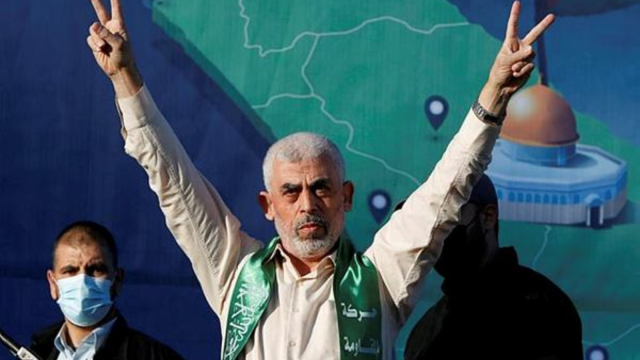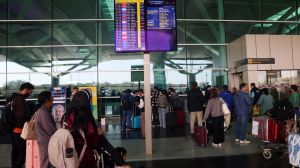Stay updated with the latest - Click here to follow us on Instagram
Who is next in line after the death of Hamas chief Yahya Sinwar?
Yahya Sinwar became the political leader two months before being killed as part of a routine patrol by Israel in Rafah on Wednesday.
 Hamas Gaza chief Yahya Sinwar gestures during an anti-Israel rally in Gaza City, May 24, 2021. (REUTERS)
Hamas Gaza chief Yahya Sinwar gestures during an anti-Israel rally in Gaza City, May 24, 2021. (REUTERS)Israel, in its determined attempt to eliminate the entire Hamas leadership, killed its newly elected political chief Yahya Sinwar on Wednesday. Sinwar, credited as the architect of the October 7 attack by Hamas on Israel, had taken the role two months ago after the assassination of Ismail Haniyeh.
Before his death on October 16 in an operation in Gaza, Sinwar had successfully evaded several assassination attempts by the Israel Defense Forces (IDF). He had been on the run for a year and was killed by Israeli forces as part of a routine patrol while lying low with three other Hamas militants in a hideout in Rafah.
While many prominent members of Hamas’s top leadership have been killed in the ongoing conflict, a few figures remain who could potentially succeed Sinwar.
Khaled Meshal — The Top Contender
According to The New York Times, Khaled Meshal is the leading candidate to replace Sinwar. Meshal has previously held the reins of Hamas’s political leadership. After Hamas went into exile, Meshal became the leader of its political office in 1996.
Soon after his appointment, Israeli agents injected Meshal with a slow-acting poison in Jordan, which sent him into a coma. He was later saved when Israel provided an antidote as part of a diplomatic deal with Jordan.
Meshal is in favor of a temporary solution, advocating for the establishment of a separate Palestinian state in the West Bank, Gaza Strip, and East Jerusalem, rather than a full peace deal with Israel, Reuters reports.
The 68-year-old former chief has spent his career across several Arab nations, including Kuwait, Jordan, Qatar, and Syria. When he stepped down as head of the political office, he was succeeded in 2017 by Haniyeh and was considered a potential replacement after Haniyeh’s assassination in July.
Born in Silwad, near the West Bank city of Ramallah, Meshal moved with his family as a boy to Kuwait, a hotbed of pro-Palestinian sentiment. He later joined the Muslim Brotherhood at the age of 15.
Khalil al-Hayya—Deputy Hamas Leader
The second most prominent Hamas leader is Khalil al-Hayya, Sinwar’s deputy. Hayya now lives in exile in Qatar after his entire family was killed in 2007 during an Israeli airstrike in Gaza.
 Hamas official Khalil Al-Hayya sits at a mourning house for assassinated Hamas chief Ismail Haniyeh in Doha, Qatar, August 2, 2024. (REUTERS)
Hamas official Khalil Al-Hayya sits at a mourning house for assassinated Hamas chief Ismail Haniyeh in Doha, Qatar, August 2, 2024. (REUTERS)
In April of this year, amid a stalemate in ceasefire talks, al-Hayya expressed Hamas’s willingness to agree to a truce of five years or more with Israel. He also stated that Hamas would disarm and convert into a political party if an independent Palestinian state were established, according to the Associated Press.
Al-Hayya, who had the trust of both Haniyeh and Sinwar, heads Hamas’s negotiation team and maintains strong ties with Iran, Reuters reported.
Mousa Abu Marzouk
Mousa Abu Marzouk helped found Hamas in 1987 and is the deputy head of its political bureau. He is a key figure in the group’s leadership hierarchy. Marzouk began his political career in the United Arab Emirates, where he helped establish a branch of the Palestinian Muslim Brotherhood. He also founded a number of Islamic institutions and foundations related to the Palestinian cause, according to the European Council of Foreign Relations.
Due to his affiliations with Hamas and the Muslim Brotherhood, Marzouk was detained by the Federal Bureau of Investigation (FBI) twice, in 1997 and 1999, and held at Manhattan jail in the US before being deported to Jordan and Syria. He left Syria in 2012, as reported by the European Council on Foreign Relations (ECFR).
The Other Sinwar
Also in the list of potential successors is Yahya Sinwar’s brother, Mohammed Sinwar, according to the Jerusalem Post. He was arrested by the IDF for suspected terrorist activities and imprisoned in Ktzi’ot Prison for nine months. During this time, he grew close to key field commanders, including Mohammed Deif, who later became key figures in Hamas’s military strategy.
Mohammed’s ability to operate underground allowed him to gather significant operational experience, making him a key player in Hamas’s military efforts. He has been on Israeli intelligence’s radar since his involvement in the kidnapping of an Israeli soldier in 2006, who was later released in exchange for Yahya Sinwar’s freedom in 2011, as reported by the Jerusalem Post.
- 01
- 02
- 03
- 04
- 05































